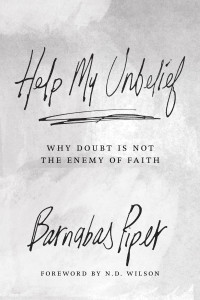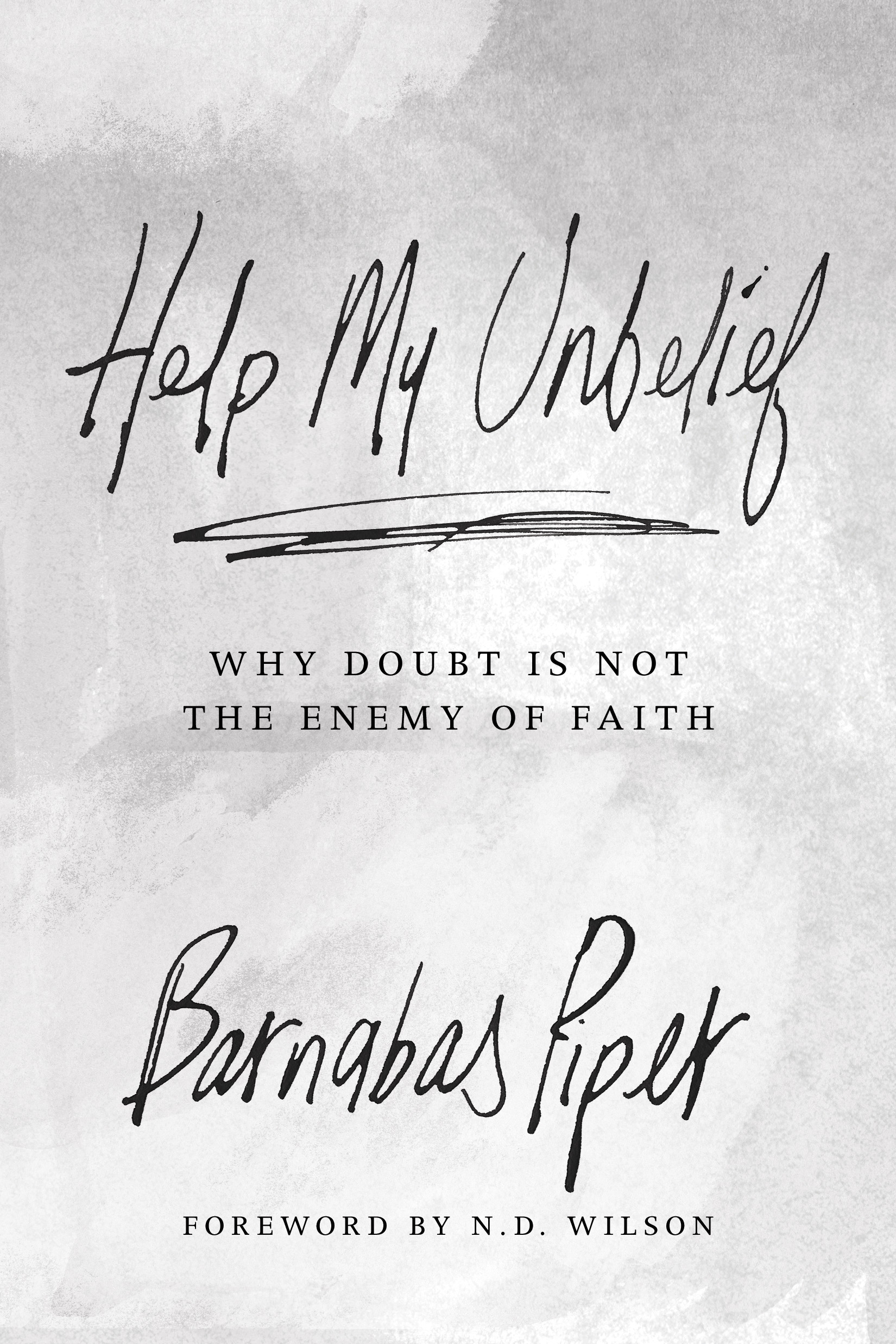(The following is an excerpt from Barnabas Piper’s forthcoming book: “Help My Unbelief”. In celebration of the launch, I have been provided with a copy for review and giveaway. Enter to win a copy of the book here!)
Answering this question is one of the greatest tasks of Christianity. So many of those who refuse to commit their lives to God do so because they do not see God this way. In fact, most of the world, especially the Western world doesn’t see Him this way.
The enlightened, progressive world, if they believe in God at all, sees Him as subservient to our understanding and human rules of logic, justice, fairness, and morality. They don’t think too much about where standards of logic, justice, fairness, and morality come from. In short they submit God to their wills and whims. If He does not abide by their framework of understanding he either is not good or does not exist. So Christians are burdened to answer the question “how do we know God is infinite and good?”
 Can we prove that He is so? No. We can’t even prove God exists. We can give evidence and arguments from scripture, but evidence and argumentation are incomplete. We can provide philosophical arguments and even some scientific indications too. But people’s souls don’t work like a court of law where a preponderance of evidence can sway a jury. A good closing argument in a discussion about the character of God will not win the day.
Can we prove that He is so? No. We can’t even prove God exists. We can give evidence and arguments from scripture, but evidence and argumentation are incomplete. We can provide philosophical arguments and even some scientific indications too. But people’s souls don’t work like a court of law where a preponderance of evidence can sway a jury. A good closing argument in a discussion about the character of God will not win the day.
Sharing our experiences, telling our stories (or “testimonies” as church folks like to call them), helps to close the gap. Explaining how we feel about God and how we came to feel that way is an effective way to connect to people. Sharing how we’ve seen his goodness and marveled at his bigness give some humanity and personal connection to big concepts. But at the same time experience is easily discounted. I know plenty of people who have had great experiences at restaurants or concerts whereas my experiences in the same situations were less than stellar. One person’s experience often has little bearing on another’s.
So many Christians struggle to explain how we know of God’s character and essence. One group leans too heavily on a CSI method: collect evidence, analyze it, and provide proof. Another group treats experiential evidence as enough, as if what they’ve experienced is the recipe for every other person’s belief. What is missing is this: relationship. Only in relationship do you know the essence of someone’s character. You know through connecting with them. The same is true with God.
When we are in relationship with God His word becomes more than a book; it becomes alive. It becomes personal. We often read the Bible like a textbook, looking for the basic information. Others read it like a Chicken Soup For the Soul sort of inspirational boost (they must skip pretty much the whole Old Testament). Many others read through it as a storybook of disparate tales offering morals and lessons like Aesop’s fables did. But if we are in relationship with God we begin to see it is a revelation. It is a window into who God is, one that He gave us to share exactly what we need to know of Him.
When this happens, no longer is the Bible just a lengthy book of many words; it is alive. It speaks. And it reads us as we read it.
For the word of God is living and active, sharper than any two-edged sword, piercing to the division of soul and of spirit, of joints and of marrow, and discerning the thoughts and intentions of the heart.
– Hebrews 4:12
As we see the Bible come alive, God’s character becomes clear. Before relationship with God the Bible’s declarations of God are statements to be weighed and tested. In relationship with Him they are more like promises that can be trusted.
Relationship with God is how we know His attributes, His character. Just as it is how we know anyone else’s. Through relationship we learn that we can trust aspects of God we can’t see or understand. He proves Himself to us; we know Him. Just as you don’t doubt your closest friends when they aren’t with you and you trust a doctor to do a surgery you yourself could not do, so we learn to trust God when we cannot see Him or understand His actions. Only far more so! Friends fail us and doctors make mistakes, yet we still trust them. But being in relationship with God allows us to see that He will never fail us or screw up.
Just as we can only know God’s essence in relationship with Him, so to the rest of the world can only see it through our relationship with Him. People get to know of my wife because I speak of her, describe what makes her tick, explain her character. But people begin to understand her when they see her relate to me and to our daughters. Just so, people will see God for who He is through our relationship with Him. What separates Him from any human relationship, though, is infinite, perfect relational capacity. He has no limits on who He can relate too. Even that is evidence of His character.
This post has been modified from Help My Unbelief: Why Doubt Is Not The Enemy Of Faith, Barnabas’s forthcoming book (David C. Cook, July, 2015)
BIO:
Barnabas Piper blogs at The Blazing Center, is the author of The Pastors Kid: Finding Your Own Faith and Identity and Help My Unbelief: Why Doubt Is Not The Enemy Of Faith, and co-hosts The Happy Rant podcast. Piper writes for WorldMag.com, contributes to numerous other websites, and speaks frequently at churches and conferences. Barnabas serves as the Brand Manager for the Leadership Development team at LifeWay Christian Resources in Nashville where he lives with his wife and two daughters.

Comments
One response to “How Do We Know and Show That God is Good? (Guest Post by Barnabas Piper)”
[…] Read an excerpt from the book I posted a bit earlier. […]